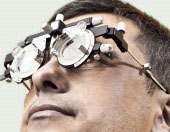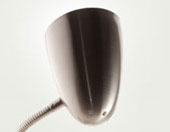
Early detection of eye disease (and tips for protecting your sight)
Posted in General Health & Wellness on August 23, 2011. Last modified on April 29, 2019. Read disclaimer.
Has it been too long since you had a thorough eye exam? If so, schedule one now. Getting a comprehensive dilated eye exam is one of the best things you can do to keep your eyes healthy. Because many common eye conditions show no early symptoms, a comprehensive eye exam can help you see your best and detect eye diseases in their early stages, before permanent vision loss has occurred.
A thorough exam includes the following:
- Dilation - Drops are placed in your eyes to dilate, or widen, the pupils and can help to identify astigmatism, presbyopia, eye damage, diabetic retinopathy, age-related macular degeneration or signs of glaucoma.
- Tonometry - This test helps to detect glaucoma by directing a puff of air onto the eye, or gently applying a pressure sensitive tip near or against the eye. Elevated pressure is a possible sign of glaucoma.
- Visual field test - Measures your side (peripheral) vision. Loss of side vision can be a symptom of glaucoma.
- Visual acuity test - Measures how well you see at various distances.
What are the most common vision problems?
When the eye is shaped perfectly, light passes through the cornea and lens so that it focuses directly on the retina. An incorrect length of the eyeball, change in cornea shape or aging of the lens, however, can cause refractive errors, where light does not focus directly on the retina. As a result, we may develop:
- nearsightedness (also known as myopia): objects up close are clear but distant objects appear blurry. Affects about 25% of Americans
- farsightedness: most commonly, distant objects appear blurry however, in significant cases, objects appear blurry at all distances. Affects 5-10% of Americans.
- astigmatism: when an eye is shaped more like a football than a basketball, which causes objects to appear blurry or stretched out.
- presbyopia (also called aging eye condition): our lenses natually harden and muscles around the lens change as we age, making it more difficult to focus on objects up close. Though degree of severity varies, presbyopia is common in people over age 35.
+ Free Shipping & Returns on Eligible Items.
(*Amazon's Top 100 list updated hourly.)
After age 60, several silent but potentially serious eye diseases become more common. These include glaucoma, AMD (age-related macular degeneration) and cataracts which, again, can be detected with a comprehensive dilated eye exam.
Tips for protecting your eye health
In addition to having a comprehensive dilated eye exam at least every other year (once a year if you have diabetes), other steps you can take to protect your vision include:
- Be aware of eye conditions or diseases that run in your family, since many such as glaucoma and age-related macular degeneration are hereditary.
- Eat a daily diet that is rich in fruits, dark, leafy green vegetables and omega-3 fatty acids (found in fatty fish such as salmon, soybean and canola oil in cooking or salad dressings, flaxseed and walnuts).
- Stay at a healthy bodyweight to lessen your chances of developing diabetes or other weight-related conditions.
- Wear safety glasses or goggles when playing sports and when performing potentially hazardous work. Be extremely cautious around fireworks or unsafe toys or games.
- When outdoors, wear wrap-around sunglasses and a wide-brimmed hat to protect against the sun's damaging UV rays which may contribute to development of cataracts, skin cancer around the eyelids and other eye disorders).
- Don't smoke since smoking has been linked with a number of eye diseases.
- Keep blood pressure under control.
- Prevent computer eye fatigue by blinking and glancing away from computer regularly.
- Maintain proper contact lens hygiene to avoid possible infection.
Take the low vision quiz
Answer these questions from the National Eye Institute to see if you might be experiencing vision loss. Even with your everyday eyeglasses or contact lenses, do you have trouble:
- Recognizing the faces of friends and relatives?
- Doing up-close work, like reading, sewing or fixing things?
- Picking out and matching the color of your clothes?
- Doing things at work or home because lights seem dimmer than they used to?
- Reading street and bus signs or the names of stores?
If you answered "yes" to any of these questions, see your eye care professional as soon as possible. If you can't afford to get an eye exam, EyeCare America-National Eye Care Project provides free or discounted eye exams to people over age 65 without insurance, Vision USA provides free eye exams for low-income Americans and Medicaid and Medicare offer limited eye care assistance.
Source:
www.nei.nih.gov/healthyeyes/eyeexam.asp

 Support for care givers
Support for care givers What's better: Organic, local or conventional produce?
What's better: Organic, local or conventional produce? What causes flatulence?
What causes flatulence? Prostate cancer symptoms and risk factors
Prostate cancer symptoms and risk factors Early detection of eye diseases
Early detection of eye diseases Reduce stress with a gratitude journal
Reduce stress with a gratitude journal Home energy savings checklist
Home energy savings checklist Quick tips for cutting your utility bills
Quick tips for cutting your utility bills